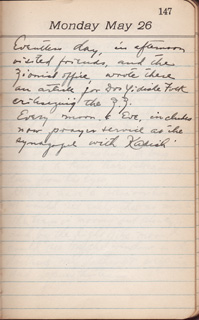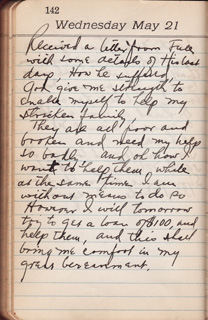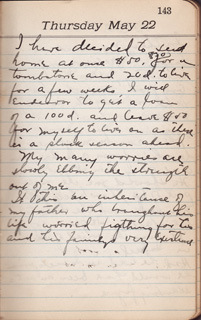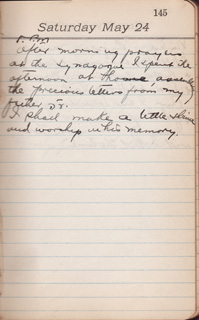
Eventless day, in afternoon
visited friends, and the
Zionist office, wrote there
an article for Dos (?) Yidishe Folk
critisizing the Z.Z.
Every morn. & eve, includes
now prayer service at the
synagogue with Kadish
————-
Matt’s Notes
The newspaper Papa refers to above, Dos Yiddishe Folk (The Jewish Nation) was an organ of the Zionist Organization of America (Z.O.A.), the group for whom Papa did most of his fundraising and recruiting work. The offices where Papa wrote his article were at 114 Fifth Avenue between 16th and 17th Streets, a healthy stroll from Papa’s neighborhood but one I’m sure he was glad to take — he was just starting a week off from work and would have wanted to stay occupied to keep depressing thoughts of his father’s recent death at bay.
The Z.O.A. published a number of other periodicals, including, according to the 1923-1924 American Jewish Yearbook, The New Palestine, a weekly, Hatoren, a monthly in Hebrew, and Young Judean, a monthly for Jewish youth in English. Dos Yiddishe Folk was the oldest of the bunch, having first appeared in 1908 when the Z.O.A. still called itself the Federation of American Zionists. (The group’s only earlier publication was a monthly started in 1901 called The Maccabean, but it looks like it was defunct by the 1920’s.)
Here’s a little more on Dos Yiddishe Folk from its own masthead:
Dos Yiddishe Folk, published weekly in the interest of Americas Zionists, by the Zionist Publishing Corp., 114 Fifth Ave., New York.
Telephone Chelsea 10,4000. Abraham Goldberg, Editor; Simon
Bernstein, Managing Editor. Subscription Rates: Payable in advance,
U.S. for 1 year, $2.50; Canada, for 1 year, $3.00; Foreign, for
1 year, $3.50. Single copies 5 cents. Entered as second class matter
February 26, 1909 at the post office at New York, N.Y. under the
Act of March 3, 1879.
In one of the happier moments I’ve had since starting Papa’s Diary Project, I was able to find the article he mentions above on microfilm in the Dorot Room of the New York Public Library.
Praises Editorial in “The Jewish Nation” Concerning the Youth of Zion Convention
Esteemed Comrade Editor,
Allow me to express in our “Jewish Nation” a few words thanking you for the editorial in your most recent edition, about the Youth of Zion convention which recently took place in Buffalo.
As someone who has been well acquainted with the aforementioned organization since its establishment, as well as with its activities, I know what harm they are doing with their separatist policies that are of no use to anyone. Everyone knows the truth, that they do nothing for their own organization as well. In the beginning, a few ringleaders, who were looking for publicity, tried to convince members of Zionist clubs to join them, and they even tried to break up these clubs. At first, some Zionists believed that they would be able to do something in order to appeal to young people with the Land of Israel ideology. But soon everyone saw that this was nothing with nothing. They created a little club in which they could play the roles of “leaders,” and they intoxicate people, encouraging them to fight against the Zionist organization. They prey upon young, recently arrived Zionists from Europe and tell them stories, the Zionist organization in America is too chauvinistic, capitalistic, etc… And the naïve young people, who sincerely believe what they are told, then find themselves unemployed: they are torn away from Zionism and they are given no other work to perform. I am convinced that the honest members of the Youth of Zion organization will have to do what many of their comrades have done for the past two years: they left the Youth of Zion organization and joined the “General” Zionist organization where, whoever wants to, can find their own place and their own tasks to perform.
It is worthwhile to mention that even the “Jewish Nation” greatly exaggerated the amount of money the Youth of Zion raised for the Pioneer Fund. Here, we saw a small group of young Zionists, who are regular members of the second and third districts, collecting money for the World Pioneer Center. There were perhaps not fewer of them than there were members of the Youth of Zion, and they went about their task with no ceremony or publicity, without “leaders” or “national executives.”
And is it not just awful when people organize a so-called convention, and they send a telegram to President Coolidge, and a cable to Prime Minister Macdonald? Do these young people not understand what the Jewish public thinks about such comic and irresponsible actions? Therefore, I offer you my sincere congratulations for your excellent editorial.
With respect and Zionist wishes,
Avrom-Zvi Sheyerman




 .
.


